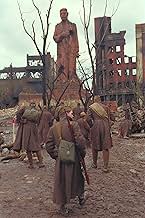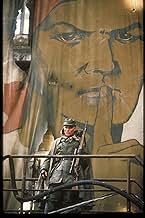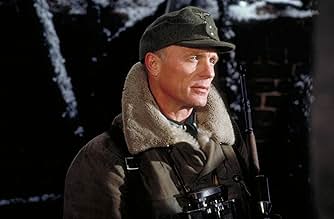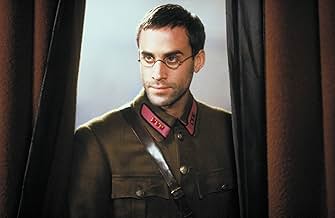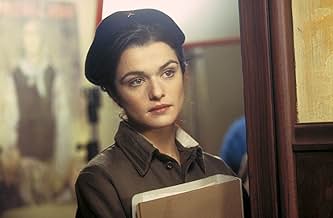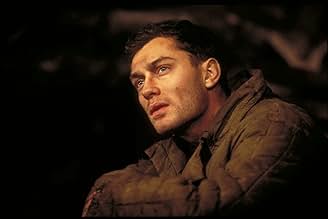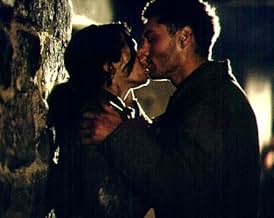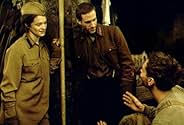Um russo e um atirador alemão de repente se encontram jogando ao jogo do gato e do rato durante a Batalha de Stalingrado.Um russo e um atirador alemão de repente se encontram jogando ao jogo do gato e do rato durante a Batalha de Stalingrado.Um russo e um atirador alemão de repente se encontram jogando ao jogo do gato e do rato durante a Batalha de Stalingrado.
- Direção
- Roteiristas
- Artistas
- Prêmios
- 7 indicações no total
- Sacha Filipov
- (as Gabriel Marshall-Thomson)
- Red Army General
- (as Hans Martin Stier)
- German NCO
- (as Clemans Schick)
- Direção
- Roteiristas
- Elenco e equipe completos
- Produção, bilheteria e muito mais no IMDbPro
Avaliações em destaque
The movie is about the real life sniper Vasily Zaitsev played by Jude Law and his exploits during the famous battle, the beginning of the movie is complete chaos as our main hero is sent to the front and we see the besieged and infamous city for the first time. It's honestly worth watching this movie just for the opening scene alone which is just incredibly well done in all aspects and portrays some of the horrors that the soviet troops would have witnessed when arriving there.
Overall this is a highly entertaining war movie, fantastic CGI for the time, everything is well shot, the set pieces are gorgeous and even the acting and characters are well done.
All that said this is of course a Hollywood production, don't expect much in the way of historical accuracy and definitely expect a silly love story (though not the worst) and everyone speaking English with poor Russian and German accents.
The film opens with the harrowing transport of thousand of Russian soldiers across the Volga River to Stalingrad The recruits were packed onto steamers, barges, whatever they could find to ferry them across the river All that under a deluge of shells, bombs and explosions
By the time Vassili arrives to Stalingrad, the Nazis have a distinct edge, and Soviet morale is at an all-time low
Leading the Russians in their seemingly futile defense is Nikita Kruschev, played by Bob Hoskins The Germans, at that time, were overrunning the place and the Russians were in an appalling state It was the most awful battle of the war
Joseph Fiennes plays Danilov, an idealistic Russian officer who passionately speaks about his belief in getting the troops to turn the grave situation in Stalingrad around He finds the perfect inspiration in Vassili
Rachel Weisz plays a young woman who volunteers to help in the war effort She's literally protecting the people she grew up with When she meets Vassili, he just has a natural intelligence, a natural instinct
Jude Law is remarkable as the young sharpshooter Vassili Zaitsev who conveyed both humanity and intensity There's such a fierce intelligence and liveliness in his eyes He can also be very quiet and internal Vassili found the complexity within the silence and stillness In fact to be a sniper is very much about a man of action through stillness Vassili represented the ultimate hero, the symbol of someone who could instill hope and belief in victory amongst the troops, because his skills as a sniper were unparalleled
Ed Harris played Major Konig, the German sharpshooter sent to hunt down Vassili He knows that Vassili was picking off German officers with some regularity, and was becoming a folk hero for the Russian soldiers as well as the Russian populace... He decided to eliminate him
The casting of Ed Harris opposite Jude Law resulted in a striking visual link between their characters They both have these unbelievably penetrating blue eyes And director Jean-Jacques Annaud began to see the duel through their eyes And one of the first shots of Ed Harris was a close-up of his blue eyes
Annaud painted the tensions very clearly and concentrated purely on the eyes of the Jude Law and Harris and, of course, on their rifles and how they were hidden and what they were doing Basically, the core of his camera is the duel of their eyes, duel of men, duel of snipers, therefore a confrontation of people that scan the surrounding buildings, and try to decipher what they see
But other than the clarification I needed between the Battle of Leningrad and the Siege of Stalingrad which I always mix up (whoops, I think I just did it again), and Hitler's and Stalin's fallacies as military leaders in relation to the symbolic importance of the Volga (and the movie could have used more strategic explanations), he and I pretty much agreed about the movie.
There's a taut, gritty war movie screaming to come out of a drekky melodrama. The best parts are the battles, of troops and individuals. The opening sequence of soldiers thrown from trains to boats to the front line is terrific and frightening.
The one-on-one between Ed Harris's Nazi sharpshooter and Jude Law's hunter (though he doesn't do working class too convincingly) is exciting.
The most captivating surprising is Bob Hoskins as Krushchev. He completely inhabits the character and brings him completely to blood and guts life - showing just what it takes to survive as a top man to Stalin.
There was also more potential in Joseph Fiennes' political officer as insight into propaganda that is only occasionally effective (after all, "Ryan" was similarly about a PR stunt).
I thankfully dozed off during most of the ridiculous sub-plot of the love triangle. There appears to be only a couple of women living in this city, and they sure do get in the way, as these few can themselves provide multi-lingual translations, sex, food, lousy child care and brave sharpshooting.
The music by James Horner is atrociously bombastic, wincibly so.
(originally written 3/31/2001)
Now I'm prepared to believe that snipers played a valuable role in this kind of warfare - I wouldn't know - but Vassili's primary value, we must assume in the absence of information to the contrary, is as propaganda - a means of keeping up the morale of the local troops. But there's something circular here. The snipers are the only people we see doing any actual fighting, and by the end of the film they seem to be devoting all their efforts to shooting a German sniper who is in turn doing nothing but trying to shoot Vassili. What does ANY of this have to do with, you know, the invasion?
The fact that the troops of a hostile foreign power are on Russian soil (they haven't yet been defeated, and it looks to be only a matter of time before even Moscow would be overrun) doesn't seem to motivate the characters to do much. Nobody makes a single decision for the good of the war effort as a whole. Danilov builds up the Vassili legend because of personal feelings and is ready to tear it down later for other personal reasons; Tania wants to kill Germans - kill them herself, by hand, rather than help her fellow soldiers as best she can by working in intelligence - because they killed her parents; Danilov tries to transfer her to a safer job not because that's where she should be (it's a mere coincidence that that IS where she should be), but because he's hitting on to her; Vassili's heart isn't in the duel with the German sniper until he has a casual acquaintance's death to avenge. When Sacha's mother is told that her son is a traitor (now serving the forces who have bombed the city she grew up in to rubble), her only reaction is, "Perhaps he'll be safer with them than with us." Wherever we look, we see dreary personal concerns. Did any of these people notice that the enemy IS at the gates?
If Anaud was trying to make his characters more plausible by making them pettier, he failed. When Sacha tells a third party what we supposedly already know - that Tania is in love with Vassili - it came as news to me. I hadn't seen any insipient love anywhere. I suppose I ought to have worked it out, by assuming that the single female character must be there to fall in love with someone and using a process of elimination to work out who it was (she plainly didn't care for one of the two candidates, therefore she must be head over heels with the other one), but really, even in a movie as dull as this, I have better things to do.
Você sabia?
- Erros de gravaçãoIn the scene where Vassili is lighting the cigarette butt he picked up from the German sniper, it's apparent by the flame he uses a butane lighter. Butane lighters were not invented until the 1950's.
- Citações
Commisar Danilov: I've been such a fool, Vassili. Man will always be a man. There is no new man. We tried so hard to create a society that was equal, where there'd be nothing to envy your neighbour. But there's always something to envy. A smile, a friendship, something you don't have and want to appropriate. In this world, even a Soviet one, there will always be rich and poor. Rich in gifts, poor in gifts. Rich in love, poor in love.
- Cenas durante ou pós-créditosThe end credits are slanted and curved.
- Trilhas sonorasLa Chanson des Artilleurs
Music by Tikhon Khrennikov
Lyrics by Viktor Gusev
(C) Musikvertag Hans Sikorski, Hamburg
Performed by The Red Army Choir (as Les Choers De L'Armee Rouge)
Courtesy of 7 Productions, Paris
Principais escolhas
- How long is Enemy at the Gates?Fornecido pela Alexa
Detalhes
- Data de lançamento
- Países de origem
- Centrais de atendimento oficiais
- Idiomas
- Também conhecido como
- Enemigo al acecho
- Locações de filme
- Empresas de produção
- Consulte mais créditos da empresa na IMDbPro
Bilheteria
- Orçamento
- US$ 68.000.000 (estimativa)
- Faturamento bruto nos EUA e Canadá
- US$ 51.401.758
- Fim de semana de estreia nos EUA e Canadá
- US$ 13.810.266
- 18 de mar. de 2001
- Faturamento bruto mundial
- US$ 96.976.270
- Tempo de duração2 horas 11 minutos
- Cor
- Mixagem de som
- Proporção
- 2.35 : 1


